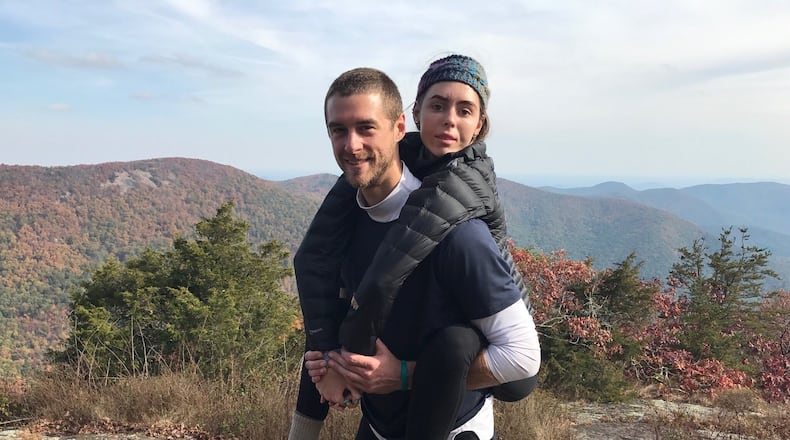Spencer Wyckoff's muscles ached and he was bone tired.
Mentally, he was exhausted as well.
At night, temperatures would drop to between 30 degrees and 40 degrees.
Turning back, though, wasn’t an option.
For nine days in October, he and others hiked roughly 82 miles through part of the Appalachian Trail.
It wasn’t an ordinary hike.
He and other hikers took turns carrying his 115-pound sister, Carden, in a specially designed harness, on their backs.
Carden Wyckoff, now 23, of Atlanta was diagnosed with a form of muscular dystrophy called facioscapulohumeral or FSHD when she was 9. It’s a progressive condition that usually affects the muscles of the face, shoulder blades and upper arms but can spread to other parts of the body, causing weakness and atrophy.
The harness, which was originally intended for parents to take their kids hiking, was retooled by its maker and then by the 210-pound Spencer. It added an extra 15 pounds.
Their goal was to raise awareness and funds to fight the disease and support the FSH Society, a nonprofit supporting research and education.
"Over the course of the last 14 years, this genetic disorder has been the source of countless physical and mental hardships throughout her (Carden's) life," according to a blog about their piggyback adventure at www.piggybackadventures.com. "Just this year, she had to make the difficult personal decision of accepting an electronic scooter to aid her day to day mobility, something she had been fighting against for years. The mental toughness required by Carden and other individuals who have to battle day and night for their physical mobility and mental well-being is not easily matched — it's safe to say that, by default, they have to be tougher for what they're forced to endure."
The hike "was incredibly tough," said Spencer, 28, of Vinings, who works in IT for Home Depot. "If we had stuck with our original plan, we definitely would have been in over our heads. Nothing is set in stone out there."
They had to adjust the plan several times. At night, they would sit around the campfire and talk about what worked and what didn’t. When their father was with them, he would lead them in prayer.
They would tweak their plans.
For instance, a truck carrying food, water and other supplies tried to follow the group as closely as it could. At some points, however, the terrain was not that accessible. They might have to change the route so the truck could remain close to them. It became a priority.
As word of their journey spread, more people joined the group at various points to hike with them or to help carry Carden. They included friends, relatives, co-workers and even strangers. Over the course of the trip, they estimated that as many as 40 people joined them at one time or the other.
Their sister, Virginia Wyckoff, wrote that the hardest part about the first day of the hike was getting the harness to sit properly and figuring out how to make Carden more comfortable.
The idea for the trip was developed by Marshall Mosher, a friend and co-founder of Athens-based Vestigo, which promotes outdoor activities by helping people find things they can do and someone to help guide them in that activity.
The Wyckoffs had done similar adventures in the past, participating in things like Spartan races, but this time, it was for a longer duration and challenging because they camped overnight.
The journey, at times, could be a challenge for Carden as well.
The weather seemed even colder to her when she was carried bareback, pressed up against someone. “They’re sweating and that, in turn, goes on to me, then I’m soaking wet and I’m moving so I get cold,” she said.
She also worried about the people who carried her. Rest and renewal were important. She didn’t want them to risk injury.
In the end, though, it was beneficial to all.
They raised about $10,000.
”It was such a beautiful place,” she said. “I think the positive energy that supported and surrounded me helped me forget about the pain. It was a humbling experience and incredible journey to have friends and family want to take me to see a part of the world that I wouldn’t have been able to see because it was not accessible. It was truly incredible to see the overlooks of the mountains and the changing foliage.”
“It blew us away,” Mosher said. “The combination of carrying a person and you think ‘I can’t do it’, but you keep pushing through because this person is someone who physically can’t do it.”
Related:
About the Author
Keep Reading
The Latest
Featured


